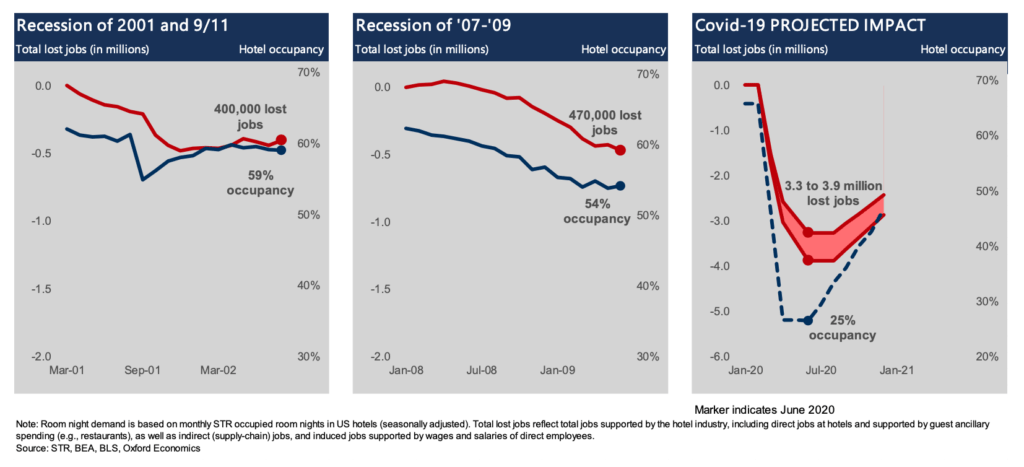The economic impact of COVID-19 across different industries is staggering. And the hotel and lodging industry is no different. The American Hotel & Lodging Association (AHLA) is reporting 8 in 10 hotel rooms are now empty because of the pandemic.
The data comes from the newly released report by the AHLA, which states things are much worse than previously anticipated. In addition to the empty rooms, the AHLA says 70% of hotel employees are laid off or furloughed.
If that wasn’t bad enough, the report goes on to say the impact of the pandemic on the travel industry is nine times worse than 9/11. And as far as low occupancy rates go, the numbers in 2020 are going to be worse than the rates in 1933 during the Great Depression.
In addressing this unprecedented situation, Chip Rogers, President and CEO of AHLA, says this was the first industry directly affected by COVID-19. Adding, there needs to be more support for the industry. “The CARES Act was an important first step with a lot of supportive measures for the hotel industry, but we need Congress to make important changes to the program to reflect the current economic reality and help the employees in the industries that have been impacted the most.”
According to Rogers, this is going to require rehiring and retaining its workforce. But as it stands now, hotels are operating with minimal staff. And the report shows the severity of COVID-19 impact on the hotel industry is going to last.
Impact of COVID-19 on Hotels
The jaw-dropping data point is the projection of a 50% decline in revenue for the entirety of 2020. Not surprisingly, it is affecting the employment rate of the industry as well as hotel-supported jobs. With 70% of hotel employees laid off or furloughed, $2.4 billion in weekly wages have been lost due to the crisis.
When it comes to hotel-supported jobs, the total loss is 3.9 million workers. And in the vast majority of cases, these workers are from small businesses. The supplemental services hotels depend on for their daily operations come from local small companies.
However, in the report, the AHLA says even the majority of hotels are small business operators. Close to two thirds or 61% of hotel properties in the U.S. are small business operators. And this highlights the need to find the funding to help these operators recover.
While large hotel chains might have the capital to keep operating, it is a different story for small operators. And it will require more help.
Rogers goes on to say, “The hotel industry is at a critical juncture. We need more resources to survive this unprecedented time.” Adding, “Additional funding is vital for small business owners across America, including tens of thousands of small business hoteliers, to help them keep their doors open and rehire and retain millions of employees.”
Comparing COVID-19 to Other Financial Crises
The travel/hotel industry is an early bell-weather for the economy as well as different types of disasters. Whether it is a financial or natural crisis, one of the first things businesses, as well as consumers, do is cancel or postpone their travel/accommodation arrangements. If the crisis is severe, then they will cancel their arrangements.
The comparison on the AHLA report of the recession of 2001 and 9/11, the recession of 07’-09’ and the projected impact of COVID-19 is telling.
During the recession of 2001 and 9/11, the industry lost 400K jobs and the occupancy rate was at 59%. For the recession of 07’-09’ the job loss went up to 470K and the occupancy rate was at 54%.

The data point from a survey carried out by TruePublic highlights the lingering effects of this pandemic. In that particular report, 52% of its respondents said they will only consider traveling abroad after a vaccine is found. When it comes to travel in the U.S., 61% say they will do so once the isolation orders are over; whether they find a vaccine or not.
Image: Depositphotos.com
